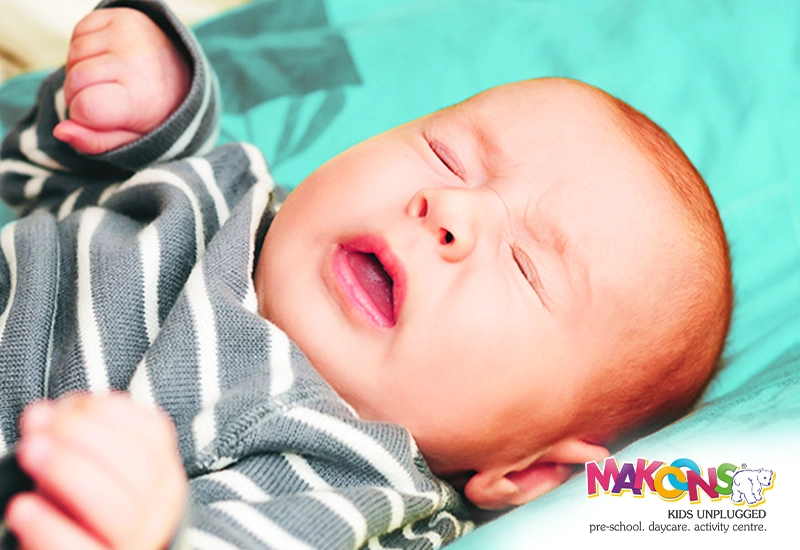Even sneezing, as a new parent you naturally worry about every little sound or movement your child produces. If your child sneezes a lot, you could question if it’s really a natural reflex or something more severe… The good news is that, usually speaking, infant sneezing is quite typical.
This thorough information on infant sneezing can help you know when a normal aspect of development is when it might indicate an underlying medical condition, and what causes sneezing in babies. Let us dissect the facts to allay those infant sneezing worries.
Is It Normal for Newborns to Sneeze Frequently?
Indeed, it’s quite natural. Little nasal passageways in newborns are quite sensitive to even the smallest airborne particles. Their body uses sneezing to naturally eliminate irritants including dust, milk drops, or mucus. Particularly since infants typically breathe via their nose, it also helps them keep their small airways free.
Actually, many newborns sneeze many times a day throughout their first several months of life—usually not reason for concern.
Common Causes of Newborn Sneezing
Let’s investigate the most often occurring, absolutely normal causes of infant sneeze that are not cause for concern.
1. Nasal Aggressives
Sneezing can be brought on by dust particles, pet dander, clothing fibers, or even strong scents like detergents or perfumes.
Newborns have a strong reflex to get anything irritating their nasal passages out of their way.
2. Ammonious Fluid Clearing
Babies may sneeze in the first few weeks to empty remaining amniotic fluid or mucus from birth remaining in their nasal passageways.
3. Parched Air
The dry air inside might bother your baby’s nose, especially in the winter. You can help your baby feel less cranky by putting a fan in his or her room.
4. The Breastfeeding Position
During feeding, milk can occasionally enter or plug the nasal canal and cause sneezing to empty it out.
5. Normal Reflex
Sneezing is another response that happens in the brain. Nasal coughing, like yawning or hiccuping, helps babies get used to life outside the womb.
These things are normal for a baby who is growing and are usually harmless. Sneezing occasionally, though, can point to anything more serious.
When to Worry: Signs of Baby Health Issues
Although occasional sneezing is common, persistent sneezing together with other symptoms could indicate a more serious newborn health problem. Here’s when you should give sneezing greater thought:
1. Runny Nose Frequent Sneezing
Particularly when sneezing is involved, a clear or colored runny nose could indicate a cold, flu, or a viral infection.
2. Lethargy or Temperature
See a doctor right away if your baby’s sneezes produce fevers, irritability, loss of appetite, or a fatigued appearance.
3.Wheezing or Coughing
A respiratory issue, including the respiratory syncytial virus (RSV), may be indicated if someone sneezes and coughs, wheezes, or struggles with breathing.,
4. Snoring or Congested Breathing
Your baby may have nasal congestion or a blockage that calls for attention if they snores or has noisy breathing coupled with sneezing.
5. Allergy Response
Though they are rare in newborns, allergies to milk protein, formula, or surroundings could cause sneezing, rashes, or even stomach problems.
See the doctor of your child if you observe more than occasional coughing. Ensuring the welfare of your small one depends on early identification of possible baby health problems.
Home Remedies and Care for Infant Sneezing
Usually, all it takes to keep your infant comfortable is basic home care. Here’s how you help your infant through a sneeze:
1. Maintaining the Clean Air
- Steer clear of strongly smelling goods near your child.
- To eliminate dust and allergens from the room, run a HEPA air purifier there.
- Keep animals away from the sleeping quarters for the baby.
2. Operate a Humidifier
- Dry air can aggravate your baby’s nasal passageways. Helping to combat dryness, a cool-mist humidifier moistens the air.
3. Use Gentle Nose Cleansing.
- If your baby feels congested, gently clear mucus using saline nasal drops and a soft bulb syringe.
4. Maintaining the Environment Smoke-Free
- Cigarette smoke is dangerous and can aggravate other respiratory disorders as well as sneezing.
5. Maintain Good Sanitation
- Before handling your kid, wash your hands regularly.
- To prevent diseases, keep your child away from sick people.
When you Should See a Doctor?
Regarding coughing, you should call the doctor of your child as follows:
- Should you sneeze and the fever exceeds 100.4°F (38°C),
- Sounds of laboured breathing, that is difficult.
- Neither want food nor drink.
- Coughing constantly or inhaling always
- Dry lips, few wet diapers—indices of dehydration
- Any change in behaviour, including excessive irritation or sleepiness,
You should trust your gut as a parent. Should something seem “off,” it’s always best to see a doctor or nurse.
Also Read : When to Worry: Warning Signs in Newborn Behavior and Appearance
Final Thoughts
Usually nothing to worry about, frequent sneezing in babies is merely a normal method for their small bodies to adapt to their environment. Understanding the difference between benign reflexes and possible newborn health problems can help you to reply coolly and confidently.
This baby sneezing guide is meant to comfort you that most of the time newborn sneezing is natural and healthy. Still, never hesitate to see your doctor if you have questions; always keep alert for concomitant symptoms.


